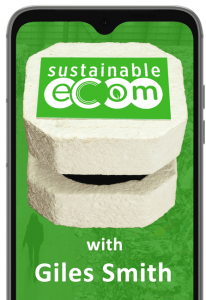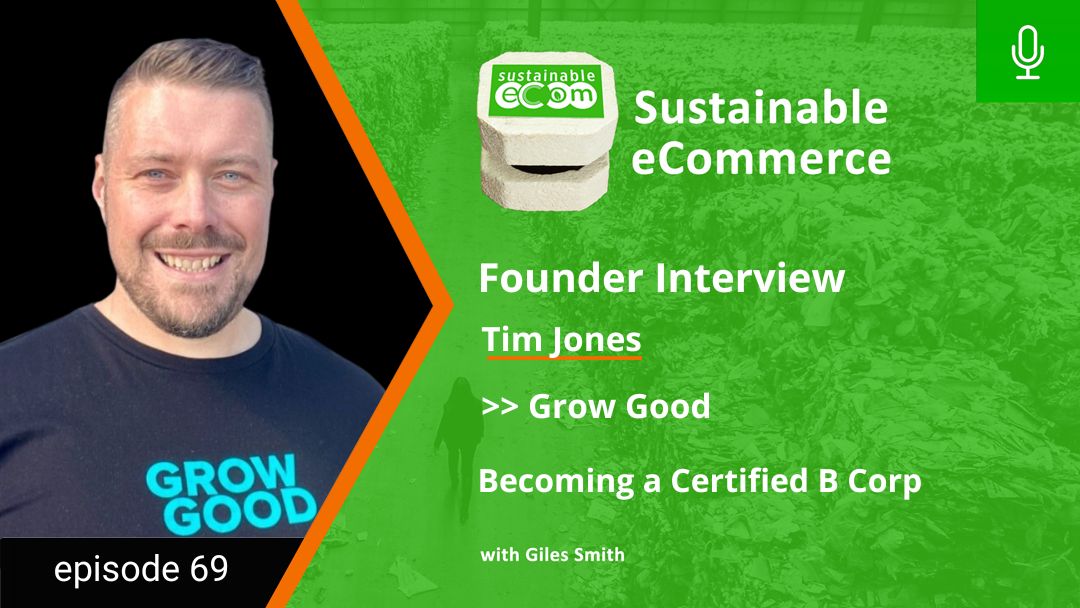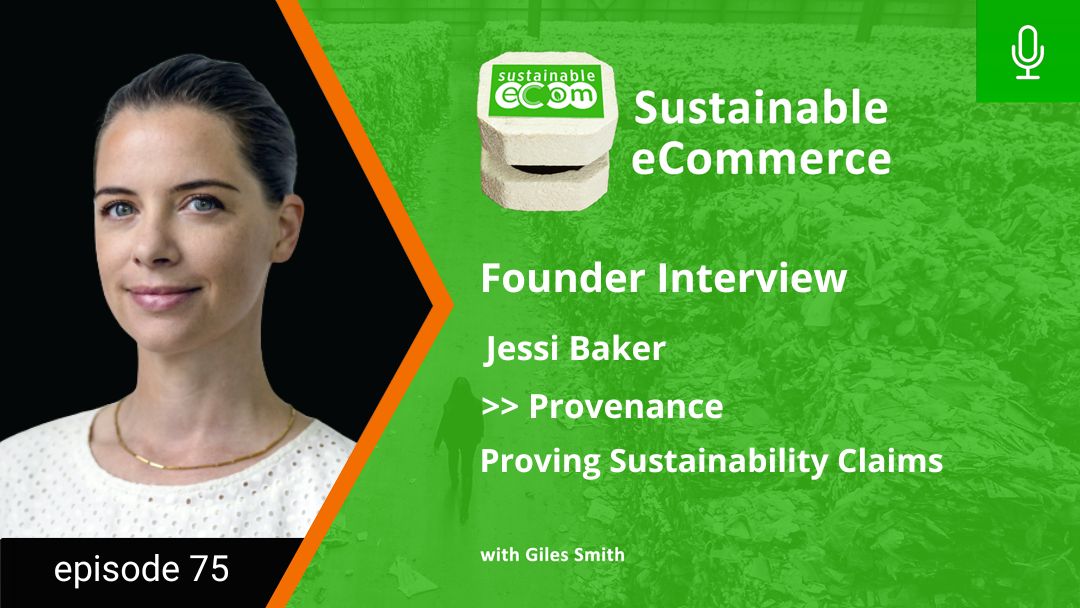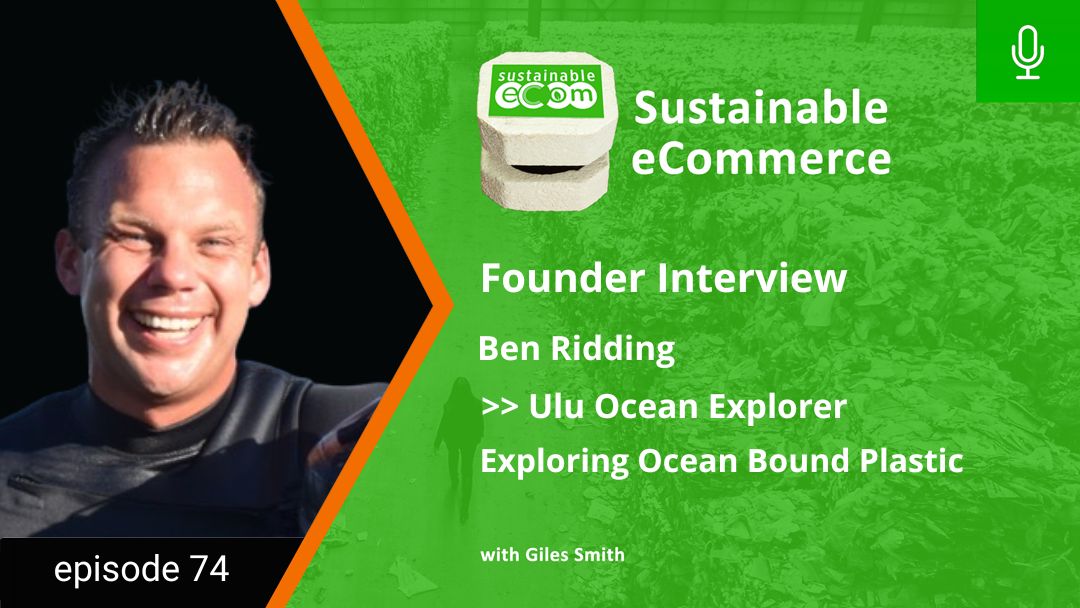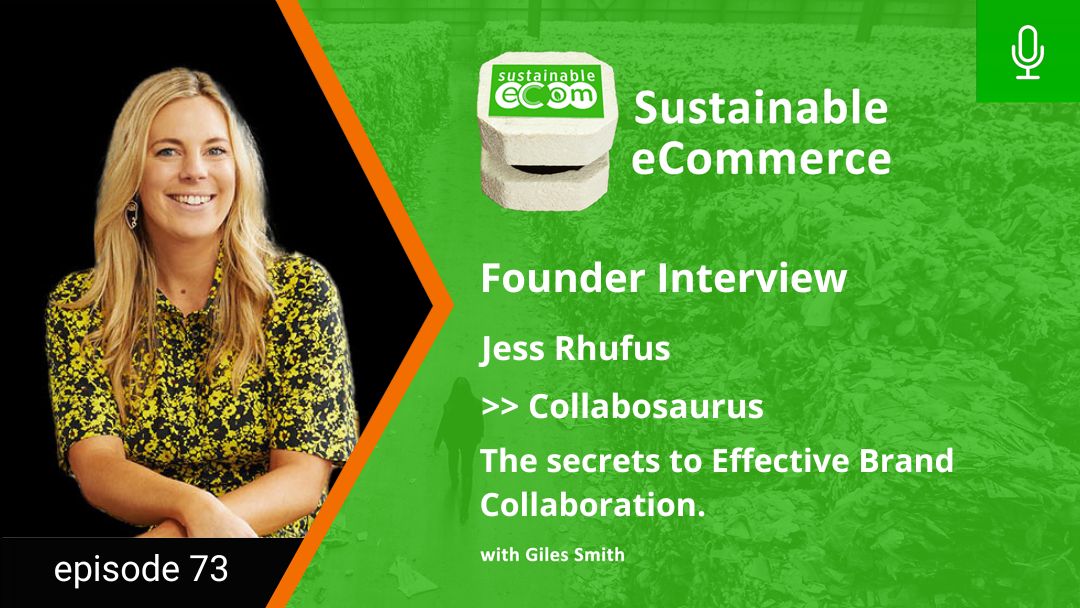Sustainable Ecommerce Podcast Episode 69
There is no doubt that we are now entering the age of increased scrutiny. Scrutiny from regulators who are increasingly cracking down on false claims, but also scrutiny from potential customers and consumers who are looking to for ways to validate their choices and feel confident that brands they buy from are doing the right things.
That usually means 3rd party certification, and by far the fastest growing certification brand in terms of both consumer awareness and brand adoption is B Corp. You’ve almost certainly already heard of B Corp Certification, but if you haven’t, it’s a business level certification that examines the conduct and impact of your business across 5 key areas – including workers, customers, environment, community and governance.
If you’re a sustainable, purpose driven brand, its quickly becoming a very important part of your proof landscape, but the benefits of going through the process by no means stop at getting a nice badge to add to your website.
To explore B Corp in more detail and help give you a deeper understanding of what’s involved, my guest today is Tim Jones, founder of Grow Good. Tim in fact was the first qualified B Corp Consultant in NZ and is better known as That B Corp Bloke, and since 2014 has helped hundreds of brands of all sizes successfully navigate what is a complicated and often daunting process.
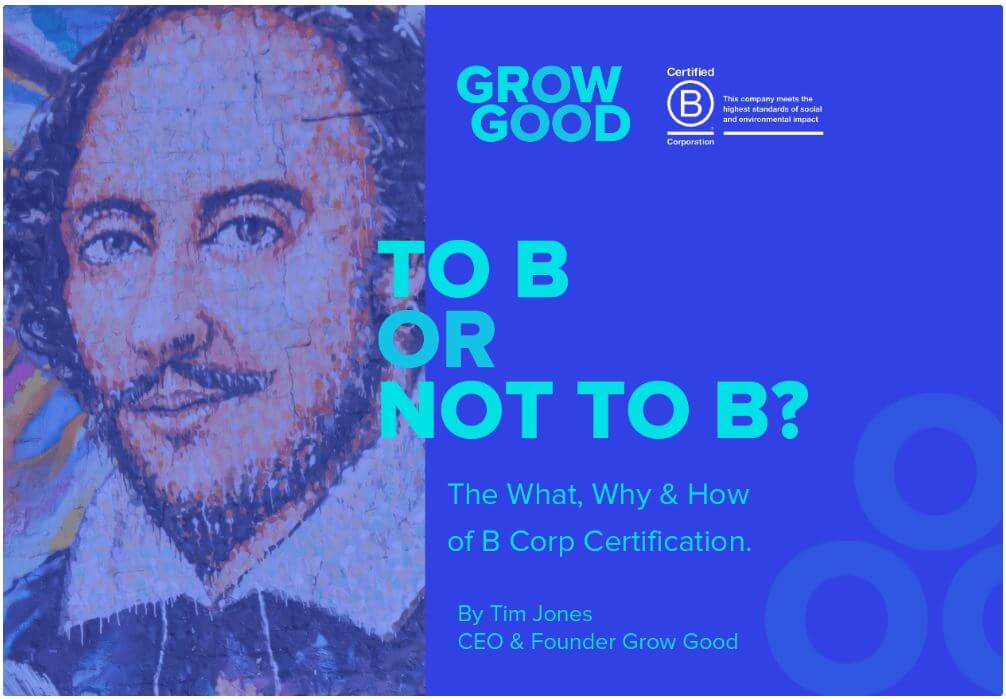
About Tim Jones
Tim is New Zealand’s 1st qualified B Consultant having successfully completed the training programme run by B Lab ANZ. To date he has helped more than 50 companies from around the world successfully navigate the B Corp Impact Assessment, and is working with new businesses every month to take them through the process.
As well as guiding clients to gain their B Corp certification, he delivers inspirational, motivational, memorable and impactful consulting, training and coaching to individuals and organisations. He helps them achieve meaningful goals in life and work, by tapping into the potential of their purpose fuelled performance.
He also holds a Certificate in Impact Measurement and Management for the SDGs from Duke University.
What are the benefits of becoming a B Corp?
Getting to B Corp is quite a journey and a pretty substantial project for an size of brand, but the benefits certainly provide payback. Many brands start the process for marketing reasons, but quickly realise there are many other benefits besides the nice badge and the significant credibility that comes with it.
The B Corp process actually provides a kind of blueprint for how to build a ‘better’ business, which for founders and leaders of small brands is by itself extremely valuable. Why try and re-invent the wheel and work everything out for yourself when there’s already a model for better business?
You’ll also find that as you grow, the process provides a compelling framework for staff engagement, and you’ll find existing staff are proud of the process and your brand becomes more attractive to new values-aligned employees.
That’s not to say the marketing impact isn’t huge though. Aside from being a globally-recognised brand validation, you’ll also find it hugely powerful to unlock new markets and find new partners, especially in the UK and US where there are now thousands of registered B Corps to work with, and retailers and wholesalers are actively looking for B Corps to stock.
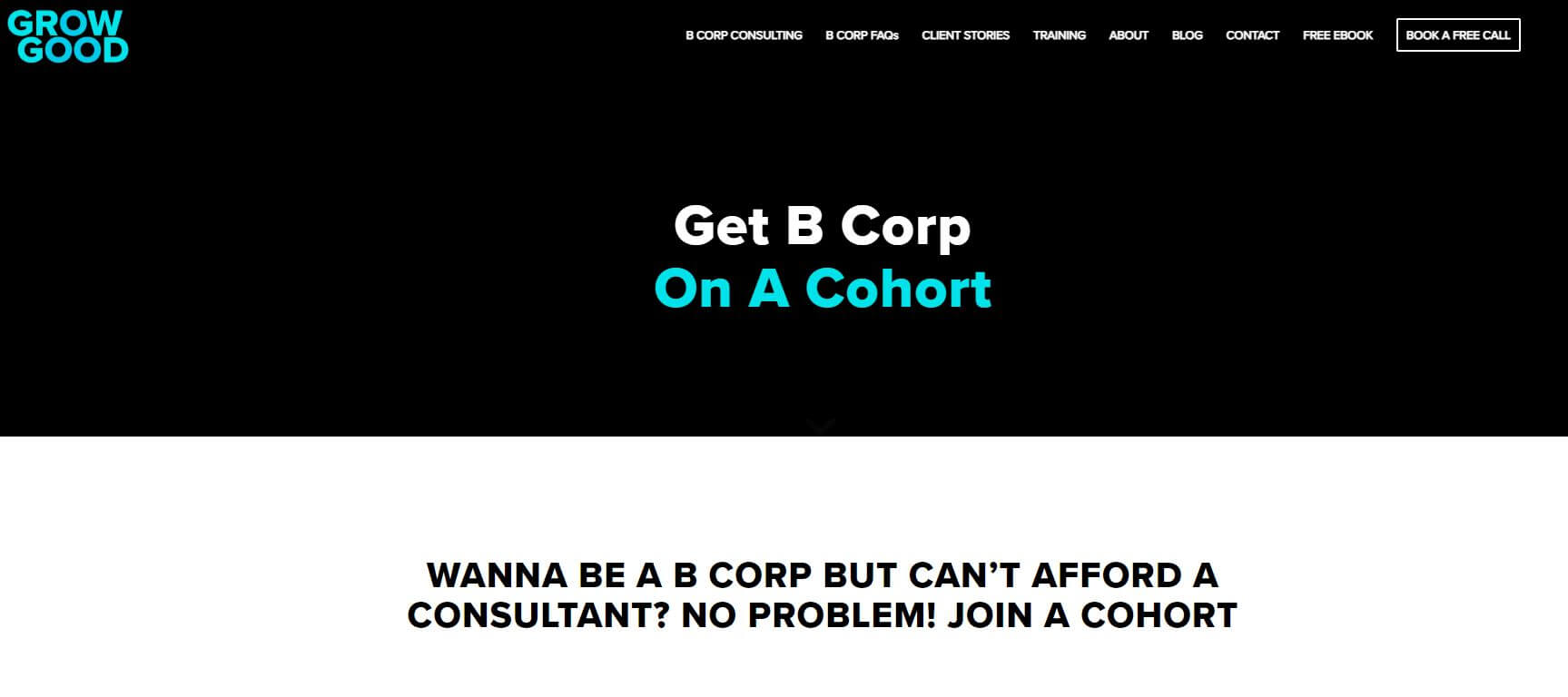
When is a good time to get started?
This is one of the most common questions that brands ask. The reality is that there is a good bit of work to do to get to B Corp. Not just the assessment itself, but changes you’ll need to implement and document in your business in order to score the required 80 points or more (out of a possible 200). You could take the view that there is no ‘good’ time, and business as usual activities will always take precedence.
However, the reality is that if B Corp certification is something you aspire to get for your brand, getting started sooner is always better than later. The assessment itself will be far simpler, and the number and scale of any changes you need to make will be far more achievable. Plus, why not develop good practices now rather than having to reverse engineer things later?
What does the certification process look like?
The first step is to go online to the B Lap site and set up your free assessment account. Based on the type and size of your business, the system will walk you through a detailed questionnaire, covering many dozens to hundreds of questions. You can save and return to the assessment at any time. When that’s complete, it will give you a provisional score. Assuming that’s less than the required 80 points, you’ll need to then work through making changes to areas where your score is low, implement and document those changes, and re-assess.
Once you’ve got to 80 points or more, you can submit your application for formal assessment and validation by the B Lab team. This process can take several months, and currently there is at least a 9 month waiting list. A B Lab assessor will ultimately drop into a 9-minute to 2 hour online session with you, drilling into various aspects of your business and ask for evidence of your claims for them to validate. With that process completed to B Lab’s satisfaction – and having paid the certification fees, you’ll become a Certified B Corporation and be able to use that logo in your marketing, packaging etc.

Where do people often get ‘stuck’ when going through the B Corp Process
According to Tim, the most common sticking point is simply resource time, and that’s especially true for small founder-led businesses. Equally though, that can be a problem for larger brands as key personnel are required along the way, and getting access to them in a timely manner can often lead to extended time frames being required.
Another big one, and where Tim’s team at Grow Good really help, is actually in understanding what the process is expecting and asking for. Sometimes it simply hard to understand what the questions even mean! Commonly, people misunderstand the questions completely, leading to wasted time in implementing the wrong changes, or equally being knocked back at the assessment stage because the assumption they made were incorrect.
That’s the main reason brands engage B Corp consultants to assist them!
How does Grow Good help?
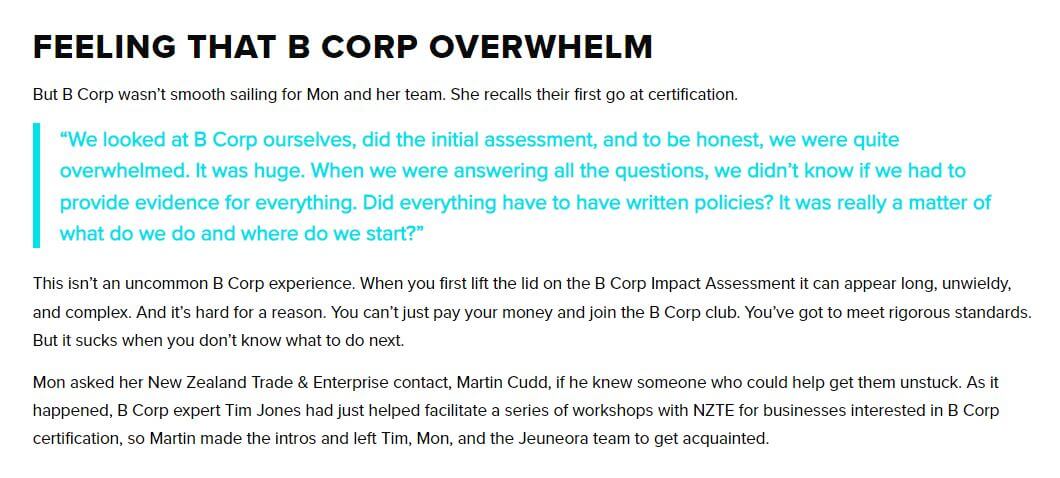
As Tim describes it, Taking the B Corp Impact Assessment is like you’re taking an open book exam, but you either don’t have notes, or they’re given to you in a language you can’t read. All the answers are there, you’re just not sure how to get them! Having been through the process many times will all different sizes of brands from many different industries, Grow Good have all the answers!
For many small brands, ‘simple’ implementation elements like creating codes of conduct of whistleblower policies can be hugely time consuming. Grow Good gives you access to a template library that can save many hours to create these yourself, or wasted money on additional consultants or lawyers to help you prepare them.
Essentially good consultants are all about helping you to simplify and fast track the B Corp certification journey!
Useful Links
Grow Good Website: https://growgood.co/
Grow Good’s Free eBook for the B Curious: https://growgood.co/bcorp-ebook/
Main B Lab Certification Site: https://bcorporation.com.au/
List of B Corp Consultants:https://bcorporation.com.au/become-bcorp/b-consultants-directory/
Current B Corp Certification Fees Calculator:https://bcorporation.com.au/certification-fees/
Free B Impact Assessment Account:https://app.bimpactassessment.net/get-started
.
Top Takeouts
Firstly, if you’ve been listening to the show for a while you’ll have heard this message time and again from the B Corps that have come on before, but if you think B Corp sounds like something that would be useful for your brand, the earlier you get started the better!
The smaller you are as a brand, especially when it comes to things like team size, number of suppliers and number of products, the easier it’s going to be to complete the process.
This is definitely NOT something that only big brands can do – and Tim’s point very clearly was, if you’re listening to this show and you have a sustainable brand and you’re NOT yet a B Corp, you’ll probably be pleasantly surprised at how many things you’re already doing that will help get you to that 80 points pass mark.
Secondly, I loved Tim’s analogy of B Corp being like the Swiss Army knife of benefits. Becoming a B Corp will help you build a better business, it will help attract and retain staff, help you attract customers, help you enter new markets, especially the US and UK, help you connect with better suppliers, and the list goes on.
Like Tim said, if you’re not seeing real cost savings as a result of implementing the B Corp blueprint, you’re probably doing it wrong!
But, all that said, it is a pretty full on process, as you would expect for something that looks at your business as a whole. That usually seems pretty daunting, especially for founder-led brands, so it definitely worth getting a guide.
One thing I love about Grow Good’s solution, especially for small brands, is their new cohort approach, which makes tackling B Corp and getting help an order of magnitude more affordable.





